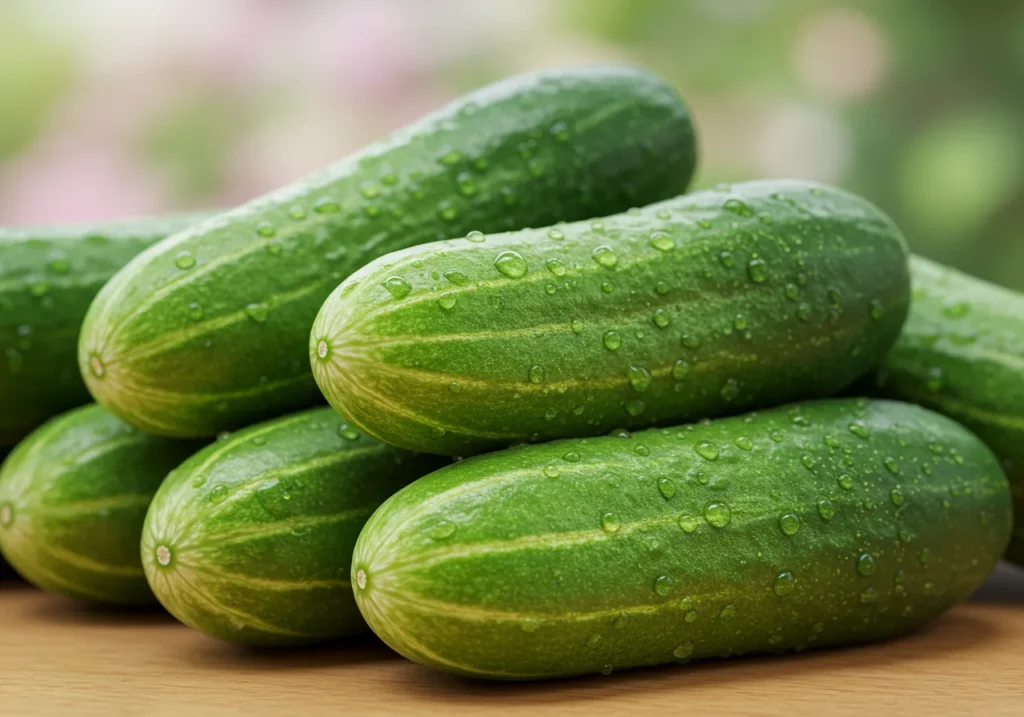Cucumbers for Diabetics: Health Benefits, Nutrition, and Blood Sugar
According to the Centers for Disease Control and Prevention (CDC), more than 38.4 million Americans have diabetes, while 97.6 million adults are living with prediabetes. Managing blood sugar levels often starts with mindful eating, and fresh vegetables play a vital role in this. Among them, cucumbers are a surprisingly powerful addition to a diabetic-friendly diet. Crisp, refreshing, and low in carbs, cucumbers aren’t just salad fillers—they may help regulate blood sugar, improve hydration, and provide antioxidants.
Nutritional Profile of Cucumbers
To understand why cucumbers may help people with diabetes, let’s look at their nutrient breakdown. According to the U.S. Department of Agriculture (USDA), here’s the nutritional value of 100 grams (3.5 ounces) of raw cucumber with peel:

- Calories: 15
- Carbohydrates: 3.6 g
- Sugars: 1.7 g
- Dietary Fiber: 0.5 g
- Protein: 0.65 g
- Fat: 0.11 g
- Water content: 95–96%
- Vitamin K: 16 mcg (21% DV)
- Vitamin C: 2.8 mg (3% DV)
- Magnesium: 13 mg (3% DV)
- Potassium: 147 mg (4% DV)
Cucumbers are low in calories and carbohydrates but high in hydration and contain essential micronutrients that support metabolic and cardiovascular health.
Glycemic Index and Glycemic Load of Cucumbers
The glycemic index (GI) ranks foods from 0–100 based on how quickly they raise blood glucose levels.
- GI of cucumbers: 15 (very low)
- Glycemic Load (GL): ~1 per 100 g serving
This means cucumbers have a minimal impact on blood sugar levels, making them an ideal food for diabetics.
What Science Says: Cucumbers and Blood Sugar?
Several studies highlight cucumbers’ potential benefits for diabetes management:
- Animal Studies on Blood Sugar Control
- A study published in Journal of Medicinal Food (2011) found cucumber extracts significantly reduced blood sugar levels in diabetic rats.
- Antioxidant & Anti-Inflammatory Effects
- Cucumbers contain flavonoids, tannins, and cucurbitacins, compounds that fight oxidative stress, which is often elevated in diabetes.
- Hydration & Kidney Support
- Since diabetes can increase the risk of dehydration and kidney issues, cucumbers’ 96% water content supports hydration and kidney function.
- Appetite & Weight Management
- Being low-calorie and high in water, cucumbers promote satiety, helping with weight loss, which is crucial for managing type 2 diabetes.
Learn More: Best Cereal for Diabetics
Benefits of Cucumbers for Diabetics
There are 8 main benefits cucumbers offer to people managing diabetes:
1. Blood Sugar Regulation
The low carb load and antioxidant compounds may help keep glucose levels steady.
2. Weight Management
One medium cucumber has just 24 calories but provides bulk and hydration, making it an excellent snack.
3. Hydration Support
Diabetics are at higher risk of dehydration. Cucumbers, with their 96% water content, naturally prevent fluid loss.
4. Heart Health Protection
High blood sugar often increases the risk of cardiovascular disease. Cucumbers contain potassium and magnesium, which help regulate blood pressure.
5. Digestive Aid
The fiber in cucumber skin supports gut health, prevents constipation, and slows down sugar absorption.
6. Antioxidant Power
Cucumbers contain beta-carotene, vitamin C, and flavonoids, which fight oxidative stress linked to diabetes complications.
7. Kidney Function
Their water and potassium balance support kidney function, reducing the risk of kidney stones, common in diabetics.
8. Easy to Add to Diet
Cucumbers can be eaten raw, juiced, pickled (unsweetened), or added to salads, soups, and smoothies.
Potential Risks and Things to Watch Out For
While cucumbers are safe for most people, diabetics should consider a few points:
- Digestive Issues: Eating too many cucumbers may cause bloating in some people.
- Pickled Cucumbers: Store-bought pickles often contain added sugar and sodium, which can spike blood pressure or sugar.
- Kidney Concerns: People with kidney disease should monitor potassium intake.
How Diabetics Can Eat Cucumbers?
Here are some practical, healthy ways to include cucumbers in a diabetes-friendly diet:
- Raw snack: Slice cucumbers and pair with hummus or Greek yogurt.
- Salads: Combine cucumber with tomatoes, onions, olive oil, and lemon juice.
- Infused water: Add cucumber slices to water for refreshing hydration.
- Soups: Try cold cucumber gazpacho.
- Smoothies: Blend cucumber with spinach, mint, and unsweetened almond milk.
- Pickles: Choose low-sodium, no-added-sugar versions.
Final Thought
Cucumbers aren’t just refreshing—they’re a nutrient-rich, low-carb, hydrating vegetable that fits perfectly into a diabetes-friendly eating plan. With their low glycemic index, high water content, antioxidants, and fiber, cucumbers help manage blood sugar, support heart and kidney health, and aid in weight control.
However, moderation and preparation methods matter. Raw or lightly prepared cucumbers are best, while sweetened or salty pickles should be limited.
For diabetics, cucumbers can be a simple yet powerful addition to everyday meals.
FAQs
Can cucumbers lower blood sugar?
Yes, studies suggest cucumbers may help regulate blood sugar, though they should be part of an overall healthy diet.
Are pickled cucumbers safe for diabetics?
Yes, if they’re unsweetened and low in sodium. Sweet pickles should be avoided.
How much cucumber can a diabetic eat daily?
Most people can safely eat 1–2 cucumbers per day as part of a balanced diet.
Do cucumbers affect insulin?
They don’t directly affect insulin but may improve sensitivity by lowering inflammation and weight.
Are cucumber juices good for diabetics?
Yes, but keep it unsweetened and pair it with fiber-rich foods.










